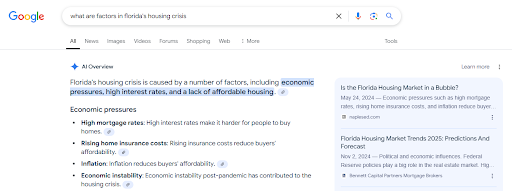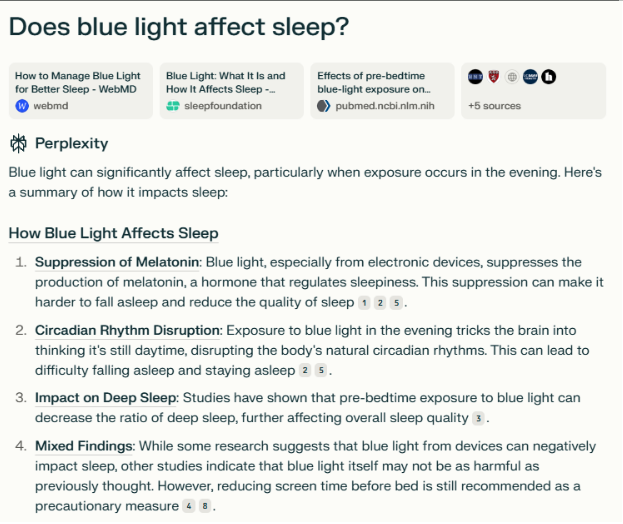Just like with SEO, it can be tempting to use clever hacks to optimize for AI search.
But the problem with hacks is that, as soon as they’re discovered, changes will be made that make those hacks ineffective.
Consider the Rank Or Go Home Challenge, where Kyle Roof managed to get his website a top ranking for the string “Rhinoplasty Plano,” despite 98% of the site being “lorem ipsum” text.
Within 24 hours of Google hearing about this, the site was de-indexed.
The same holds true for AI search, but here, the system is changing at a breakneck pace. What works today may well not work a month from now.
Understanding GEO
Generative Engine Optimization (GEO) is the emerging field of optimization for AI search. This includes optimizing to appear in Google’s AI Overviews, Gemini, ChatGPT, Grok, and others.
This field is evolving rapidly, meaning that tactics used today may not work in a year.
Here are a few examples of how quickly generative AI evolves, according to a key benchmark analysis by Ithy about OpenAI’s o1 to o3 models.
Mathematical reasoning: AIME 2024 benchmark accuracy rose from 83.3% to 96.7%, a 13.4% improvement.
Scientific reasoning: Using the GPQA Diamond Benchmark, ChatGPT’s “o3 scored 87.7% accuracy compared to o1’s 78.0%, demonstrating a stronger capacity to handle complex, PhD-level science questions with greater precision and depth.”
Coding: ChatGPT has significantly improved from o1 to o3, with o3 “achieving a 71.7% accuracy rate, a significant increase from the o1 model’s 48.9%.”
This means that, in the long term, hacking the system simply won’t be cost-effective. Any hack you uncover will have a very limited shelf life.
Instead, we should turn to a tried and true tactic from SEO: aligning consensus.
What Is Consensus, And How Do You Align With It?
Put simply, consensus is when a variety of high-quality sources align on a topic.
For example, if you ask Google if the earth is round or flat, the resulting snippet will tell you it is round because the vast majority of high-quality sources agree on this fact.
 Screenshot from search for [is the earth round or flat], Google, February 2025
Screenshot from search for [is the earth round or flat], Google, February 2025The highest-ranking results will be sites that agree with this consensus, while results that don’t align rank poorly.
AI search works in much the same way. It can identify the general consensus on a topic and use this consensus to decide which information is most relevant to a user’s search intent.
Building Consensus Through PR
So, then, building consensus is key for GEO. But, how can you help build consensus?
The answer is through the use of experts.
How Experts Build Consensus
Let’s take an example from Mark Cuban, a financial expert and Florida resident.
When discussing the topic of the housing crisis in Florida on the platform Bluesky, he stated that a major issue is the affordability of home insurance.
This, was then cited by a variety of articles on sites like GoBankingRates.
Further articles may then also cite this article, perhaps bringing in other experts to comment.
Soon, a consensus forms: Florida’s housing crisis is due at least in part to homeowners’ insurance rates. And if we ask Google this question, the AI snippet reflects just that.
 Screenshot from search for [what are the factors in florida’s housing crisis], Google, February 2025
Screenshot from search for [what are the factors in florida’s housing crisis], Google, February 2025Even a single expert’s opinion can have a major impact on consensus, especially for smaller, more niche topics.
Positioning Expertise To Build Consensus
The important thing to keep in mind is consensus cannot be faked.
Building consensus requires convincing people. And to convince people, you’ll need to establish your expertise and credibility and get a conversation going to establish consensus on a topic.
In other words, you’ll need:
Credible expertise.
High-quality data or insights.
Enough coverage or references across the web to establish that your viewpoint is widely accepted (or at least seriously considered) by other experts.
Say you want to build consensus around the idea that the best way to pay off debts is to prioritize debts with the highest interest rates.
By publishing original research that shows this to be true, backed by the voice of an established expert, you can start a conversation on this topic.
As further blog posts and online conversations reference your data, your position will gain greater reach. Then, more experts may comment on it and agree with it, over time building that consensus on the topic.
Then, when somebody goes to research the topic with AI search, the AI will find that consensus you’ve built.
Consider the case of blue light.
In 2015, the Journal of Clinical Sleep Medicine published a study:
“Evening use of light-emitting eReaders negatively affects sleep, circadian timing, and next-morning alertness.”
This study showed that exposure to blue light suppresses melatonin production, leading to delayed sleep onset and reduced sleep quality.
This research was then cited by experts and major outlets before gaining traction on social media and blogs.
Now, if you AI search “Does blue light affect sleep?” you’ll be given this information (that blue light affects sleep), and it will cite this original research and the websites and experts who wrote about it.
 Screenshot by author from Perplexity, February 2025
Screenshot by author from Perplexity, February 2025Collaboration For Building Consensus
Of course, you don’t have to simply wait for a conversation to find its way to other experts. By collaborating directly, you can amplify the establishment of a consensus.
Let’s take the same example as before. But, this time, we make a small change: Instead of authoring studies or guest posts solo, we do so in collaboration with another established expert.
In doing so, you can essentially “hijack” your collaborator’s authority and audience:
Their followers will become aware of your research.
Their peers and fellow experts are more likely to consider your findings.
Media outlets also view collaborations as more credible than a single, lesser-known source, further boosting your reach.
Take the example of David Grossman’s article The Cost of Poor Communications.
Inclusion in an article published on Provoke Media’s The Holmes Report, allowed Grossman to present his ideas to a wider audience.
This information went on to be referenced in a variety of other articles, including sites such as Harvard Business School.
Then, over time, these ideas form part of the consensus on business communication, appearing in AI search results for platforms such as Perplexity.
 Screenshot by author from Perplexity, February 2025
Screenshot by author from Perplexity, February 2025Even With The Best Methods, Building Consensus Is A Process
This is, of course, a simplification of the process.
Authoring a study, or collaborating with another expert, is no guarantee that you will build a new consensus.
Your study or collaboration may simply go unnoticed, even if you do everything right.
Or, it may go against the existing consensus. In this case, you’ll face a serious uphill battle to try and change that consensus.
Even if you are successful, it may take some time for a new consensus to emerge.
These things don’t happen overnight. But, that doesn’t mean you should give up; every time you publish a study or collaborate with another expert, your reach and authority grows.
And as you continue the conversation through further studies and guest posts, a new consensus can begin to form.
At the heart of that new consensus are your ideas and expertise.
In turn, when providing sources for its search results, AI search will surface your ideas and drive traffic to your website.
Long-Term Success Over Short-Term Hacks
While new hacks are always being found, tried and tested methods will always be the better choice.
Instead of chasing an ever-moving target trying to outsmart constantly evolving generative AI tools, your time is much better spent building consensus around a topic.
This means:
Establishing expertise through studies and guest posts.
Collaborating with other experts to boost your reach and authority.
Continuing this process of authority building over time.
Building consensus takes time, but the payoff is lasting influence, which sees AI search surfacing your content and treating you as a trusted source of information.
More Resources:
Featured Image: Roman Samborskyi/Shutterstock

